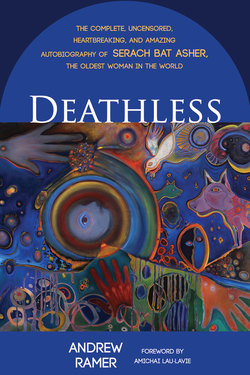Читать книгу Deathless - Andrew Ramer - Страница 5
На сайте Литреса книга снята с продажи.
Foreword
ОглавлениеThis story starts with a little girl, singing to herself behind the tents, not knowing just how deeply soothing her songs are to her grandpa, the patriarch Jacob, shrouded in his grief. As a reward for his healing, Serach bat Asher will become the oldest woman to live within the pages of the Bible, perhaps beyond, and the story, her story, never quite seems to end either. Some stories are worth infinity.
Known to us through a narrative that is part myth, part midrash, part mystery, this lesser-known heroine from the margins of Jewish folklore is enjoying a comeback. After thousands of years in footnotes, Serach’s story once again pops up in children’s books, feminist anthologies, and in this astounding work of fiction. It’s not just a story about the power of song that Serach brings to us, but also a critical message for humanity’s progress and for what it means to persist, to resist, to be other, and to belong.
Like other mythic muses, Serach is the one who chooses when to show up and with whom to chat. One hot summer afternoon in the last year of the 20th century I was hanging out on Venice Beach in California when I caught a glimpse of an older woman with white hair and a bikini, rollerblading down the boardwalk, headphones on, and singing loudly. Possibly in Yiddish. That night I started writing about Auntie Mem, a tough old Holocaust survivor who chose to live in California and chose to live, live, live. Some of what she had to say was published and even made it to the stage, her essence living on—always surprising, bitter, not sweet, but funny, loving, and in-your-face real. Whoever that rollerblading woman was, and no matter where the story came from—she profoundly changed my life.
Many years later my dear friend and revered teacher Andrew showed me the outline of a project he’d been working on: the story of the 3,000 years of Serach, including the part where she’s living—on Venice Beach. “We’ve already met, right on the beach,” I told him, with amazement. And now I know I’m not the only lucky one. Serach, a heroine with many faces, has a lot to say and she knows how to find the proper channels. That’s how she met Andrew.
Andrew Ramer is a brilliant bard who knows how to spin sacred texts and how to queer the very myths we’re living. His Serach is a crone with an eye on the big picture and the long arc, a brittle laugh and the wizened wisdom of longevity that has a lot say to our impatient digital days of instant gratification. This is a prophetic work of protest, only somewhat shrouded in the veils of satire and imagined meanderings through time and space, the tale of a survivor, of an often-bitter old woman whose story isn’t always easy to read. Through his telling of her travels he is not just telling us her story but is also offering a radical way to reread the original biblical stories themselves, now more queer, more nuanced, and even more interesting.
A longtime scholar and author of midrash, Andrew wrote about this delicate process of retelling in his book Queering the Text: “The text itself changes, and we do as a result. While this may seem radical, it is, in fact, a part of a longstanding anti-fundamentalist strand of the Jewish tradition, which sees the Bible not as a quasi-historical record. . . but as a font of multiple interpretations.”
So here she is. Put on your seat belts, and enjoy the ride. And if and when you meet her, on the beach at dusk, in the margins of this book, or in your dreaming, please send regards and pause to listen with attention. This story begins with a girl who is singing, and if you are reading this—she’ll be singing her songs for you.
Rabbi Amichai Lau-Lavie
Creator of Storahtelling and the founding spiritual leader of Lab/Shul NYC
